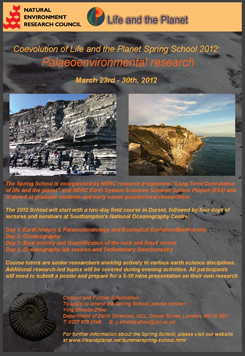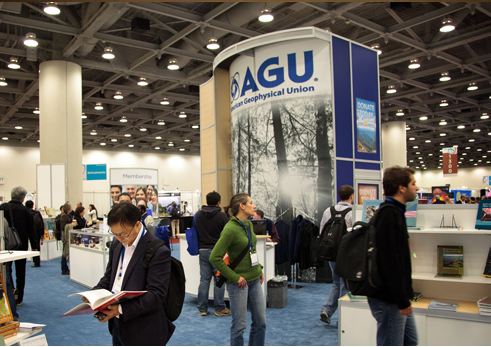Royal Society Meetings report
In October 2011, a Royal Society Discussion meeting, organised by project members Dan Lunt and Richard Pancost, explored the relationship between warm climates of the past, and future climates. Gavin Foster and Paul Pearson, also members of the project, gave keynote addresses.
The meeting was very well attended, and included some lively questioning and debate. The Discussion meeting was followed by a Royal Society Kavli meeting, which brought together the international community involved in reconstructing past CO2. As a result of this meeting, and partly funded by the Descent into the Icehouse project, Lunt, Foster and Pancost will be writing a Review paper aimed at reconciling past CO2 and temperature estimates with results from climate models.
PhD opportunities at Southampton
PI Gavin Foster is advertising four NERC funded PhD projects this year. One in particular (Atmospheric CO2 during the Early Cenozoic) is directly related to this project.
Three other three topics available are:
(i) Boron isotopes in diatoms: a proxy for pH?
(ii) Assessing the magnitude of anthropogenic ocean acidification using boron isotopes;
(iii) Reconstructing the Greenland Ice Sheet in the middle Pliocene.
Funding is not guaranteed and is subject to interview. If you are interested please follow this link to find out how to apply.
Coevolution of Life and Planet Spring School 2012
At the end of the March 2012, (23rd – 30th March 2012), the “Long-Term Coevolution of Life and the Planet” programme will have its first Spring School. Its purpose is to provide an overview of the state-of-the-art paleoenvironmental research to graduate students and early career postdoctoral researchers -mainly those involved in the programme but other NERC students can be accepted in exceptional cases.
The Spring School will start with a two and a half day field course in Dorset, followed by four days of lectures and seminars at Southampton’s National Oceanography Centre coorganised by NERC Earth System Sciences Summer/Spring School Project (ES4).
The outline for the course content is as follows.
Day 1-3: Field course in Dorset
Day 4: Earth history & Palaeoclimatology and Ecological Evolution/Biodiversity
Day 5: Oceanography
Day 6: Boat activity and Quantification of the rock and fossil record
Day 7: Oceanography lab session and Sedimentary Geochemistry
Timetable of the Spring School:
Friday, 23rd, March: Arrival in Southampton Parkway Station at midday. Departure as a group from Southampton at 1pm! During the fieldwork, accommodation will be in Portland Heights Hotel.
Sunday, 25th, March: After the weekend’s fieldwork, drive to Southampton Holiday Inn.
Monday, 26th –Thursday 29th, Lectures and seminars in Southampton National Oceanography Centre
Friday, 30th, travel home
Bursary and fee
The cost of participation will be strongly subsidized by the programme. Nevertheless, a submission fee of £150 for PhD students and £250 for postdoctoral researchers is required.
Travel to and from Southampton is not include in the bursary. But all the accommodation, meals and travel during the field course in Dorset and later in Southampton will be fully covered.
Download the Timetable of Spring School March 2012
Applications must be made by 12 pm (noon) on 31st January 2012. To apply please contact:
Ying Shields-Zhou
Department of Earth Sciences
University College London (UCL)
Gower Street
London, WC1E 6BT
Participation at the Fall 2011 AGU Meeting
By Dan Lunt
In December 2011, the American Geosciences Union (AGU) held its annual congress meeting in San Francisco. Several members of the project attended. Of particular interest was a session, chaired by three project members Gavin Foster, Richard Pancost and Dan Lunt, as well as Mark Pagani, titled “The pre-Quaternary concentration of atmospheric CO2 – proxies and mechanisms for change”.
The session discussed novel CO2 proxies, and explored mechanisms for how CO2 has varied in the past on multi-million year timescales. Several of the talks, including the keynote address given by Prof Michael Bickle, focussed on the role of weathering in controlling CO2 flux and the large uncertainties associated with this challenging field, were highlighted in many of the talks. It appears that there is still much work to be done!
The “Descent into the Icehouse” project will be making a crucial contribution to these issues, by improving proxy records of CO2 across the key Eocene-Oligocene transition. Also by quantifying the importance of oceanographic changes in determining these CO2 changes, and their relation to changes in key oceanographic gateways.
This year nearly 20,000 Earth Scientists attended the meeting that focussed on a huge variety of topics (other highlights can be found at http://www.realclimate.org/).
Links
Follow us on Twitter
Recent Posts
- In the News : What a three-million year fossil record tells us about climate sensitivity
- Past evidence confirms recent IPCC estimates of climate sensitivity
- Crucial new information about how the ice ages came about : PR & Podcast
- 2014 Sino-UK Coevolution of Life and the Planet Summer School
- Past and Future CO2 – Reconstructing atmospheric Carbon Dioxide









